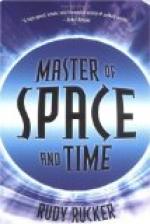Bell was almost without funds, his closest friends now seemed to turn upon him, and altogether he was in a sorry plight. Of course Sanders and Hubbard meant the best, yet in reality they were seeking to drive their protege in exactly the wrong direction. As far back as 1860 a German scientist named Philipp Reis produced a musical telephone that even transmitted a few imperfect words. But it would not talk successfully. Others had followed in his footsteps, using the musical telephone to transmit messages with the Morse code by means of long and short hums. Elisha Gray, of Chicago, also experimented with the musical telegraph. At the transmitting end a vibrating steel tongue served to interrupt the electric current which passed over the wire in waves, and, passing through the coils of an electro-magnet at the receiving end, caused another strip of steel located near the magnet to vibrate and so produce a tone which varied with the current.
All of these developments depended upon the interruption of the current by some kind of a vibrating contact. The limitations which Sanders and Hubbard sought to impose upon Bell, had they been obeyed to the letter, must have prevented his ultimate success. In a letter to his mother at this time, he said:
I am now beginning to realize the cares and anxieties of being an inventor. I have had to put off all pupils and classes, for flesh and blood could not stand much longer such a strain as I have had upon me.
But good fortune was destined to come to Bell along with the bad. On an enforced trip to Washington to consult his patent attorney—a trip he could scarce raise funds to make—Bell met Prof. Joseph Henry. We have seen the part which this eminent scientist had played in the development of the telegraph. Now he was destined to aid Bell, as he had aided Morse a generation earlier. The two men spent a day over the apparatus which Bell had with him. Though Professor Henry was fifty years his senior and the leading scientist in America, the youth was able to demonstrate that he had made a real discovery.
“You are in possession of the germ of a great invention,” said Henry, “and I would advise you to work at it until you have made it complete.”
“But,” replied Bell, “I have not got the electrical knowledge that is necessary.”
“Get it,” was Henry’s reply.
This proved just the stimulus Bell needed, and he returned to Boston with a new determination to perfect his great idea.
Bell was no longer experimenting in the Sanderses’ cellar, having rented a room in Boston in which to carry on his work. He had also secured the services of an assistant, one Thomas Watson, who received nine dollars a week for his services in Bell’s behalf. The funds for this work were supplied by Sanders and Hubbard jointly, but they insisted that Bell should continue his experiments with the musical telegraph. Though he was convinced that the opportunities lay




